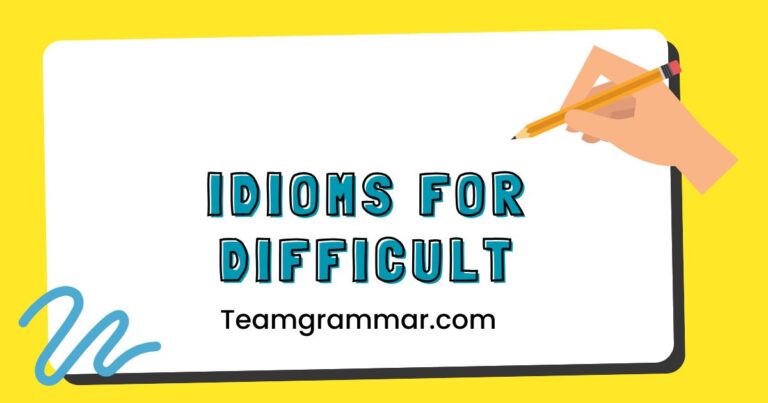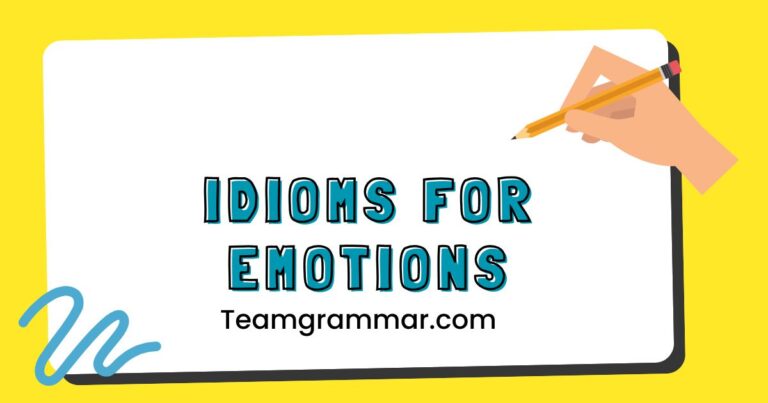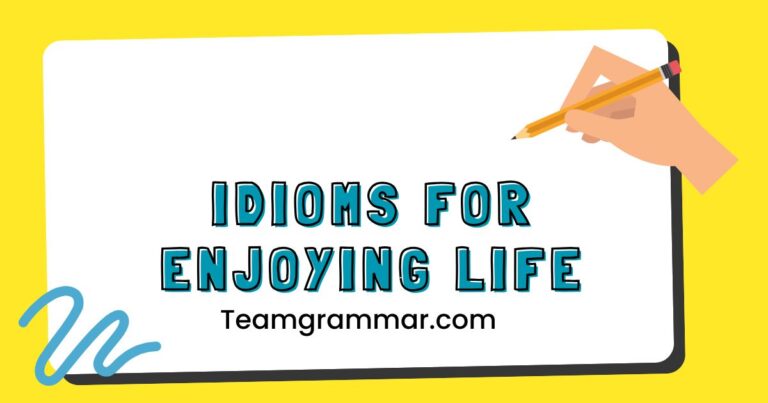39 Beach Idioms: Mastering Figurative Language for Sun & Sand
Idioms add color and depth to the English language, making conversations more engaging and relatable. Understanding idioms related to the beach not only enhances your vocabulary but also provides a cultural insight into how native speakers express themselves.
This article explores a variety of beach-themed idioms, their meanings, origins, and usage. Whether you’re an ESL student, a language enthusiast, or simply curious about the nuances of English, this guide will equip you with the knowledge to confidently use and understand beach idioms in various contexts.
Learning these idioms will help you grasp the subtle nuances of everyday conversations and written texts, making your communication more effective and enjoyable.
Table of Contents
- Introduction
- Definition of Idioms
- Structural Breakdown of Idioms
- Types and Categories of Beach Idioms
- Examples of Beach Idioms
- Usage Rules for Beach Idioms
- Common Mistakes with Beach Idioms
- Practice Exercises
- Advanced Topics
- FAQ
- Conclusion
Definition of Idioms
Anidiomis a phrase or expression whose meaning cannot be understood from the ordinary meanings of the words it contains. In other words, it’s a figurative expression where the overall meaning differs from the literal meaning of the individual words.
Idioms are essential for understanding the nuances of a language, as they often reflect cultural values and historical contexts. Recognizing and using idioms correctly can significantly improve one’s fluency and comprehension in English.
Idioms are often used in everyday conversations, literature, and media, making their understanding crucial for effective communication.
Idioms can be classified based on their structure and function. Some idioms are metaphorical, using figurative language to convey a particular meaning.
Others are phrasal verbs, which combine a verb with a preposition or adverb to create a new meaning. Additionally, idioms can be categorized by the themes they represent, such as emotions, situations, or specific environments like the beach.
Their primary function is to add color and expressiveness to language, making it more vivid and engaging. Idioms can also serve to simplify complex ideas or emotions into easily digestible phrases.
Understanding the context in which an idiom is used is vital for accurate interpretation.
Structural Breakdown of Idioms
Idioms typically consist of multiple words that, when combined, create a meaning different from their individual definitions. The structure can vary, including phrases with verbs, nouns, adjectives, and prepositions.
It’s crucial to recognize that idioms are fixed expressions, meaning their words cannot be altered without losing the intended meaning. For example, the idiom “a drop in the ocean” cannot be changed to “a drop in the sea” without altering its recognized meaning.
Understanding the structure helps in identifying idioms within sentences and comprehending their overall message.
The patterns within idioms often involve metaphorical comparisons, such as “smooth sailing,” which compares a journey to a calm sea. Some idioms also rely on exaggeration or understatement to create emphasis.
For example, “to be sunk” implies a severe and likely irrecoverable failure. Grammatically, idioms can function as different parts of speech, acting as nouns, verbs, adjectives, or adverbs within a sentence.
Recognizing the grammatical function of an idiom is essential for using it correctly in various contexts. The fixed nature of idioms means that their grammatical structure must be preserved.
Types and Categories of Beach Idioms
Beach idioms can be categorized based on the specific elements of the beach environment they reference. These include idioms related to the sun, water, sand, and general beach experiences.
Each category offers unique expressions that capture different aspects of beach life and related metaphorical meanings. This categorization helps in understanding the nuances and applications of each idiom.
By grouping idioms thematically, learners can more easily grasp their meanings and remember their usage.
Sun-Related Idioms
These idioms often relate to warmth, visibility, and the passage of time. They can describe clarity, happiness, or the exposure of hidden things.
The sun, as a central element of the beach experience, provides rich metaphorical ground for expressing various concepts.
Water-Related Idioms
Water idioms often symbolize emotions, fluidity, and the ebb and flow of life. They can describe calmness, turbulence, or the overwhelming nature of certain situations.
The sea’s vastness and power make it a potent symbol for many abstract concepts.
Sand-Related Idioms
Sand idioms can denote instability, the passage of time, or the ease with which things can be lost or forgotten. The shifting nature of sand makes it an ideal metaphor for impermanence and change.
General Beach-Related Idioms
These idioms encompass broader aspects of the beach experience, such as relaxation, leisure, and the overall atmosphere. They can describe a carefree attitude, a period of rest, or a temporary escape from everyday life.
Examples of Beach Idioms
This section provides extensive examples of beach idioms, organized by the categories discussed above. Each idiom is accompanied by its meaning and example sentences to illustrate its usage in context.
These examples will help you understand how to incorporate beach idioms into your own conversations and writing.
Sun-Related Idioms
The following table provides examples of idioms related to the sun, highlighting their meanings and usage in sentences. Understanding these idioms can add depth to your descriptions and make your language more expressive.
| Idiom | Meaning | Example Sentence |
|---|---|---|
| Everything under the sun | Absolutely everything; all things imaginable | They sell everything under the sun at that market. |
| A place in the sun | A favorable position; a chance for success | Every entrepreneur dreams of finding a place in the sun. |
| Soak up the sun | To enjoy the warmth and light of the sun | We spent the afternoon soaking up the sun on the beach. |
| Under the sun | In existence; in the world | There’s nothing new under the sun. |
| Catch some rays | To sunbathe; to expose oneself to the sun | Let’s go to the beach and catch some rays. |
| Rise and shine | To wake up and get out of bed, often early | Rise and shine! It’s time to start the day. |
| Make hay while the sun shines | To take advantage of an opportunity while it lasts | They are making hay while the sun shines by investing in renewable energy. |
| Sun-kissed | Having a tan from the sun | She looked radiant with her sun-kissed skin. |
| As different as night and day | Completely different | Their personalities are as different as night and day. |
| Chase rainbows | To pursue unrealistic goals | He’s always chasing rainbows, never settling down. |
| Ray of hope | A small amount of optimism | The new treatment offers a ray of hope for patients. |
| Steal someone’s thunder | To take credit for someone else’s accomplishments | He stole my thunder by announcing my idea as his own. |
| Come rain or shine | Regardless of the circumstances | I’ll be there for you, come rain or shine. |
| Every cloud has a silver lining | There is always something positive in a bad situation | Even though he lost his job, he knows every cloud has a silver lining. |
| In broad daylight | Openly; without attempting to hide | The robbery happened in broad daylight. |
| Like a ray of sunshine | Someone who brings happiness | Her smile is like a ray of sunshine. |
| Under a cloud | Under suspicion or doubt | He’s been under a cloud since the accusations were made. |
| Brighten up the day | To make someone’s day better | Your visit really brightened up my day. |
| Face the music | To accept the consequences of one’s actions | He had to face the music after lying to his boss. |
| Light at the end of the tunnel | Hope for the future | After months of hard work, we finally see the light at the end of the tunnel. |
| Sunshine state | A state known for its sunny weather (e.g., Florida) | We are planning a vacation to the sunshine state this winter. |
| Sun’s out, guns out | A phrase used when the weather is sunny and people are showing off their muscles | It’s a sunny day, sun’s out, guns out! |
Water-Related Idioms
The following table provides examples of idioms related to water, illustrating their meanings and usage in sentences. These idioms often convey ideas of emotion, fluidity, and overwhelming situations.
| Idiom | Meaning | Example Sentence |
|---|---|---|
| Make waves | To cause trouble or controversy | The new policy is likely to make waves in the company. |
| Go with the flow | To be flexible and adapt to circumstances | Sometimes it’s best to just go with the flow and see what happens. |
| In deep water | In serious trouble | He’s in deep water with the IRS. |
| Test the waters | To try something new to see if it is successful | They decided to test the waters before launching the new product. |
| Like water off a duck’s back | Having no effect on someone | Criticism rolls off him like water off a duck’s back. |
| Still waters run deep | A quiet person may have strong emotions or abilities | He doesn’t say much, but still waters run deep. |
| Troubled waters | Difficult or uncertain situations | The company has been navigating troubled waters for months. |
| Water under the bridge | Past events that are no longer important | That argument is water under the bridge now. |
| Blood is thicker than water | Family relationships are stronger than others | Despite their disagreements, blood is thicker than water. |
| Pour oil on troubled waters | To calm a situation | His diplomacy helped to pour oil on troubled waters. |
| Throw someone in at the deep end | To give someone a difficult task without preparation | They threw him in at the deep end by assigning him to manage the project. |
| Dead in the water | Failed; not progressing | The project is dead in the water due to lack of funding. |
| Clear as mud | Not clear at all | His explanation was as clear as mud. |
| Fishing for compliments | Trying to get compliments | She’s always fishing for compliments about her new dress. |
| A drop in the ocean | A very small amount compared to what is needed | Our donation is just a drop in the ocean compared to the total cost. |
| Sink or swim | To succeed or fail by one’s own efforts | They gave him the project and told him to sink or swim. |
| Caught between the devil and the deep blue sea | Faced with two difficult choices | He was caught between the devil and the deep blue sea, unsure of what to do. |
| Make a splash | To gain attention or be successful | The new movie is expected to make a splash at the box office. |
| Rock the boat | To cause problems or disturbance | He doesn’t want to rock the boat by suggesting changes. |
| Take the plunge | To take a risk | They decided to take the plunge and start their own business. |
| Swim against the tide | To go against the majority | He’s always swimming against the tide with his controversial opinions. |
| Get your feet wet | To start something new or gain initial experience | She’s just getting her feet wet in the real estate market. |
Sand-Related Idioms
The following table provides examples of idioms related to sand, showing their meanings and usage in sentences. These idioms often relate to impermanence, time, and the ease of losing things.
| Idiom | Meaning | Example Sentence |
|---|---|---|
| Draw a line in the sand | To set a limit or boundary | The company drew a line in the sand regarding project expenses. |
| Bury one’s head in the sand | To ignore or avoid a problem | He’s burying his head in the sand about his financial issues. |
| Shifting sands | Unstable or changing circumstances | The political landscape is like shifting sands. |
| Sand through your fingers | Something slipping away or being wasted | Time is like sand through your fingers, so use it wisely. |
| Castles in the sand | Dreams or plans that are unrealistic | Building castles in the sand is a waste of time. |
| Set in stone | Fixed and unchangeable | The deadline is set in stone and cannot be changed. |
| Grain of salt | To not take something too seriously | Take his advice with a grain of salt; he’s not always right. |
| Sand trap | A difficult or dangerous situation | He’s stuck in a sand trap at work, with no way out. |
| Slip through the cracks | To be overlooked or forgotten | Important details often slip through the cracks when you’re rushing. |
| Foundation of sand | An unstable or weak basis for something | Their relationship was built on a foundation of sand, so it didn’t last. |
| In the grand scheme of things | Considering everything | In the grand scheme of things, this problem is not that important. |
| Hit rock bottom | To reach the lowest point | After losing his job and home, he hit rock bottom. |
General Beach-Related Idioms
The following table provides examples of general beach-related idioms, illustrating their meanings and usage in sentences. These idioms often relate to relaxation, leisure, and escape.
| Idiom | Meaning | Example Sentence |
|---|---|---|
| Life’s a beach | Life is easy and enjoyable | Since retiring, life’s a beach for him. |
| Beach bum | Someone who spends a lot of time at the beach, often unemployed | He’s a real beach bum, always surfing and relaxing. |
| Smooth sailing | Easy progress; without problems | After the initial difficulties, the project was smooth sailing. |
| Ship has sailed | It’s too late; the opportunity is gone | You missed the deadline; that ship has sailed. |
| All hands on deck | Everyone is needed to help | We need all hands on deck to finish the project on time. |
| Plain sailing | Easy and without problems | After the initial setup, it was plain sailing. |
| Anchor down | To settle in a place | They decided to anchor down in the small coastal town. |
| A sea change | A major transformation | The company underwent a sea change after the new CEO arrived. |
| Keep your head above water | To manage to survive despite difficulties | He’s struggling to keep his head above water financially. |
| Lost at sea | Confused or uncertain | I’m feeling lost at sea with all these new changes. |
| Salty dog | An experienced sailor or someone who loves the sea | He’s a salty dog who knows everything about boats. |
| Call the shots | To make the decisions | As the manager, she gets to call the shots. |
| Run ashore | To get stranded | The old boat ran ashore during the storm. |
| Take the helm | To take control or leadership | She will take the helm as the new director. |
| Fair-weather friend | Someone who is only there in good times | He’s a fair-weather friend who disappears when things get tough. |
Usage Rules for Beach Idioms
Using idioms correctly requires understanding their specific meanings and contexts. It’s important to avoid literal interpretations and to be aware of the cultural nuances associated with each idiom.
Idioms should be used in situations where figurative language is appropriate and will enhance communication. Overusing idioms can make your language sound unnatural or forced, so it’s best to use them judiciously.
When using beach idioms, consider your audience and the overall tone of your communication. Some idioms may be more suitable for informal conversations, while others can be used in more formal settings.
Pay attention to the grammatical structure of the idiom and ensure that it fits correctly within the sentence. Remember that idioms are fixed expressions, so avoid altering their wording.
Practicing with example sentences and real-life scenarios can help you become more confident in using beach idioms correctly.
Common Mistakes with Beach Idioms
One common mistake is interpreting idioms literally, which can lead to misunderstandings. For example, if someone says “life’s a beach,” they don’t mean life is literally a sandy shore; they mean life is easy and enjoyable.
Another mistake is altering the words of an idiom, which can change its meaning or make it nonsensical. For instance, changing “a drop in the ocean” to “a drop in the sea” loses the intended impact.
Another frequent error is using idioms in inappropriate contexts. Using an informal idiom in a formal presentation can sound unprofessional.
Additionally, overusing idioms can make your language sound unnatural or forced. It’s important to strike a balance and use idioms sparingly to enhance your communication without overwhelming it.
Always consider your audience and the purpose of your message when deciding whether to use an idiom.
Here are some examples of correct and incorrect usage:
| Incorrect | Correct | Explanation |
|---|---|---|
| He’s burying his head in the ground. | He’s burying his head in the sand. | The correct idiom is “bury one’s head in the sand,” not “ground.” |
| Life is a sandy shore. | Life’s a beach. | “Life’s a beach” is the established idiom for an easy life. |
| She’s in deep lake. | She’s in deep water. | The idiom is “in deep water,” meaning in serious trouble. |
Practice Exercises
These exercises will help you practice using beach idioms correctly. Fill in the blanks with the appropriate idiom from the list provided.
Understanding the context of each sentence is crucial for selecting the correct idiom.
Idiom List: life’s a beach, make waves, in deep water, go with the flow, draw a line in the sand, bury one’s head in the sand, smooth sailing, ship has sailed, all hands on deck, a drop in the ocean
| Question | Answer |
|---|---|
| 1. Since he retired, __________. | life’s a beach |
| 2. The new policy is expected to __________. | make waves |
| 3. He’s _________ with the tax authorities. | in deep water |
| 4. Sometimes it’s easier to just _________. | go with the flow |
| 5. The company had to _________ regarding expenses. | draw a line in the sand |
| 6. He can’t keep _________ about his debts. | burying his head in the sand |
| 7. After the initial setup, it was _________. | smooth sailing |
| 8. You missed the deadline; the _________. | ship has sailed |
| 9. We need _________ to finish the project. | all hands on deck |
| 10. Our contribution is just _________ compared to what’s needed. | a drop in the ocean |
Exercise 2: Choose the correct idiom to complete the sentence.
| Question | Options | Answer |
|---|---|---|
| 1. He’s always _________, trying to get compliments. | a) fishing for compliments b) swimming against the tide c) rocking the boat | a) fishing for compliments |
| 2. They decided to _________ and start their own business. | a) make a splash b) take the plunge c) test the waters | b) take the plunge |
| 3. He doesn’t want to _________ by suggesting changes. | a) keep his head above water b) rock the boat c) swim against the tide | b) rock the boat |
| 4. She’s just _________ in the real estate market. | a) getting her feet wet b) making waves c) going with the flow | a) getting her feet wet |
| 5. The project is _________ due to lack of funding. | a) dead in the water b) in deep water c) troubled waters | a) dead in the water |
| 6. Their personalities are _________. | a) like a ray of sunshine b) as different as night and day c) under a cloud | b) as different as night and day |
| 7. After months of hard work, we finally see the _________. | a) sunshine state b) light at the end of the tunnel c) face the music | b) light at the end of the tunnel |
| 8. Even though he lost his job, he knows _________. | a) every cloud has a silver lining b) come rain or shine c) steal someone’s thunder | a) every cloud has a silver lining |
| 9. She looked radiant with her _________ skin. | a) sun-kissed b) under the sun c) catch some rays | a) sun-kissed |
| 10. We spent the afternoon _________ on the beach. | a) rise and shine b) steal someone’s thunder c) soaking up the sun | c) soaking up the sun |
Advanced Topics
For advanced learners, exploring the etymology and historical context of beach idioms can provide a deeper understanding of their meanings and cultural significance. Many idioms have origins in maritime history, folklore, or literature.
Researching these origins can reveal interesting insights into how language evolves and reflects societal changes. For example, the idiom “smooth sailing” likely originated from the experiences of sailors navigating calm seas, where progress was easy and uninterrupted.
Additionally, analyzing the use of beach idioms in literature and media can enhance your comprehension of figurative language and its impact on storytelling. Authors and filmmakers often use idioms to create vivid imagery, convey emotions, and add layers of meaning to their work.
Paying attention to how idioms are used in different contexts can improve your ability to interpret and appreciate complex narratives. Furthermore, comparing beach idioms across different languages can offer insights into cultural differences and similarities in how people perceive and describe the beach environment.
FAQ
- What is the difference between an idiom and a literal expression?
An idiom is a phrase whose meaning is different from the literal meaning of the words it contains. A literal expression means exactly what it says.
- Why are idioms important in learning English?
Idioms are essential for understanding native speakers and grasping the nuances of the language. They add color and depth to communication.
- Can I create my own idioms?
While you can be creative with language, idioms are generally established expressions. Creating your own may not be understood by others.
- How can I improve my understanding of idioms?
Read widely, listen to native speakers, and pay attention to context. Use flashcards and practice exercises to reinforce your learning.
- Are idioms the same in all English-speaking countries?
No, idioms can vary between countries and regions. Some idioms are specific to certain dialects or cultures.
- Is it okay to use idioms in formal writing?
It depends on the context. Some idioms are appropriate for formal writing, while others are too informal. Use your judgment or consult a style guide.
- What should I do if I don’t understand an idiom?
Ask for clarification or look it up in a dictionary or online resource. Understanding the context can also provide clues.
- How often should I use idioms in my speech?
Use them judiciously. Overusing idioms can make your speech sound unnatural. Aim for a balance between clarity and expressiveness.
- How can I remember the meanings of different idioms?
Try associating the idiom with a visual image or a personal experience. Repetition and active use can also help with memorization.
- Are there any resources that can help me learn more idioms?
Yes, there are many dictionaries, websites, and language learning apps that focus on idioms. Look for resources that provide definitions, examples, and practice exercises.
Conclusion
Mastering beach idioms enhances your ability to understand and communicate effectively in English. These idioms, rooted in the imagery and experiences of the beach environment, add color and depth to your language.
By understanding their meanings, origins, and usage rules, you can confidently incorporate them into your conversations and writing. This not only improves your fluency but also provides a cultural insight into the English language.
Remember to practice regularly and pay attention to the context in which idioms are used. Avoid literal interpretations and be mindful of your audience.
With consistent effort, you can expand your vocabulary and become more proficient in using idioms. Continue to explore the rich and diverse world of English idioms, and enjoy the journey of language learning.
So, go forth and use these idioms to paint vivid pictures with your words, bringing the essence of the beach to your communication!







